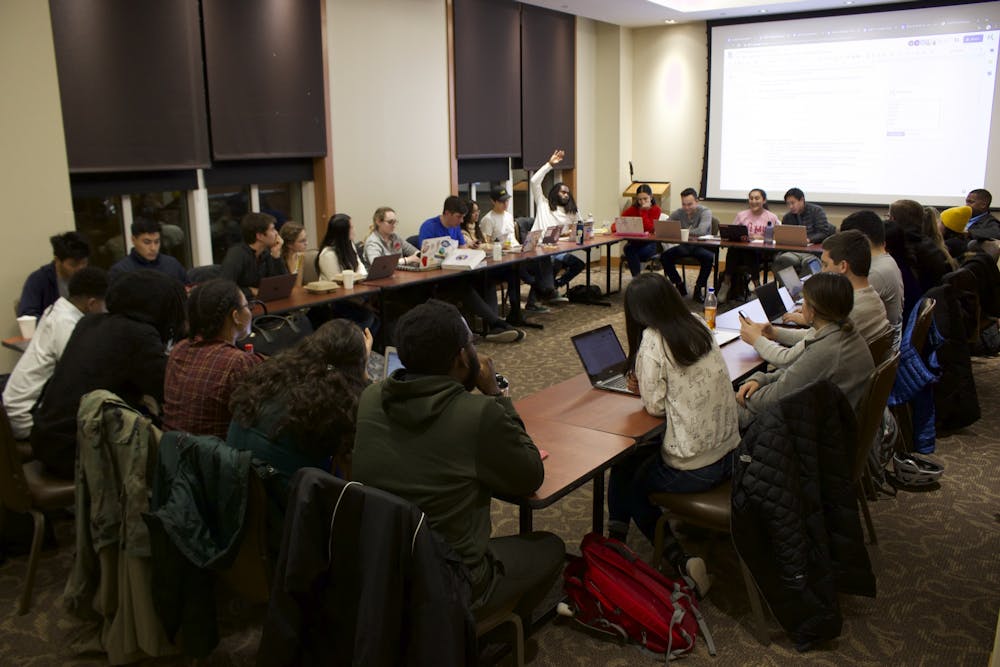If you’re reading this article, there is a very good chance that you’re actively involved in one or more of the 350 student groups that receive Hopkins funding. That means that you’re likely already familiar with the controversial reforms the University has recently taken in this area.
This semester, the Student Government Association (SGA) and Office of Student Leadership and Involvement (SLI) have undertaken comprehensive audits of club activities intended to ensure that all clubs which receive University funding meet the school’s established guidelines for student organizations. Two areas of interest have received the most scrutiny.
The first is financial debt, which affects dozens of clubs and often reaches into the tens of thousands of dollars. The second is ensuring that student groups promote inclusivity in their membership criteria. Additionally, in order to grant these audits the attention they require, the University placed a temporary freeze on applications for new student clubs.
As with any bureaucratic endeavor, the auditing process has not been smooth. It has been a burden to students looking to start new clubs and to those clubs whose financing has recently been cut or frozen.
These challenges have been compounded by poor communication from the offices charged with administering student clubs and a lack of transparency around the aims and methods of the audits.
The frustrations surrounding the changes in the University’s policies regarding student clubs are well-founded. Still, the actions that SGA has taken in the last few months are ultimately in the best interest of the student body.
As I see it, Hopkins is working to address long-standing structural issues that have plagued its clubs and the offices charged with administering them for years. Both of the issues that the audits seek to address represent real long-term threats to the health of our student organizations.
If we fail to recognize that widespread debt and exclusivity are directly harming much of the student body, we would be doing a profound disservice not only to current students, but to those who will find themselves dealing with these same issues long after we have graduated.
As the former treasurer of a club that had a significant amount of debt, I know that this is rarely the fault of the club itself. More often, the root causes can be found in a lack of accessibility to the club’s financial status reports and miscommunication with the (often over-worked) administrators who are responsible for club finances.
Simply put, this situation cannot continue. It is an unsustainable administrative model to allow consistent overspending, whether the club is aware that they have exceeded their budget or not.
The University must take steps to ensure that the long-term financial viability of its student organizations is secure. This is, in part, what the audits are intended to accomplish. Already, we are starting to see some progress. SLI recently announced a new system by which clubs will be able to monitor their account balances in real time.
Of course, the short-term consequences of this intervention are often harmful. Even so, SGA has not made decisions like suspending new club applications lightly.
Pragmatically, it makes little sense to entertain the idea of allowing new clubs which would be entitled to University funding while the school is actively reviewing its current clubs’ financial situations.
The second source of tension between student groups and the University administration has been a renewed commitment to enforcing the school’s policies regarding inclusiveness. SLI stated clearly that “Student organizations must be open to all persons of the University community.”
It is imperative that our clubs be accessible to students of all backgrounds. Though reasonable exceptions might be made for performing art groups, club sports or cultural organizations, the principle of inclusiveness is one on which our University cannot afford to falter.
Clubs that currently have high barriers to entry (unreasonably high membership dues, lengthy interview processes, or caps on membership numbers) must seriously reevaluate their standards. A student who wishes to join a club that receives University funding should not be turned away by criteria developed without University oversight.
It is important to mention here that the Parents Fund, which is the ultimate source of a large portion of club financing, is part of the push for inclusivity. Parent donors want to ensure that their contribution serves the entire student body.
As current students, we should embrace the spirit of this change. We should recognize that any administrative reform will come with a difficult period of transition and accept that the end goal — a system of clubs that is open to any Hopkins student — will benefit the Hopkins community as a whole.
SGA’s recent steps to address structural issues with Hopkins student organizations are necessary. They will secure the long-term health of the clubs that so many of us see as crucial parts of our college experience. Though the pains that have come with the reevaluation of club financing and membership requirements are impossible to ignore, we should recognize that real change is imperative to ensuring that we — and the students who will come after us — can continue to enjoy a positive ecosystem of extracurricular organizations for years to come.
Tim Shade is a junior from Baltimore, Md. studying International Studies and Political Science. He was the treasurer of the Men’s Club Ultimate team from 2018-2019 and is a Staff Writer for The News-Letter.





